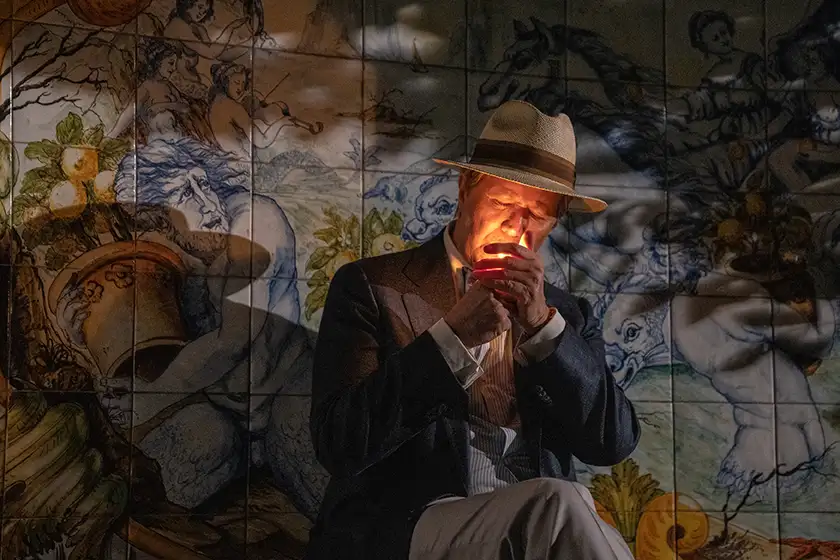Sorrentino delivers a typically gorgeous but shallow tribute to his hometown in Parthenope. Plenty of bodies on display, but little soul.
Director: Paolo Sorrentino
Genre: Drama, Fantasy
Run Time: 136′
Cannes Premiere: May 21, 2024
Release Date: February 7, 2025 in US theaters
Parthenope opens with a barge sailing into Naples port, carrying a French royal chariot. The image sums up the film in a nutshell. Writer-director Paolo Sorrentino wishes to bring a little class to his hometown, and counteract any number of negative stereotypes attached to the city. The result is Parthenope, a typically handsome effort that never really achieves any depth.
Sorrentino has built a career of toying with the balance of style against substance, but he’s overegged the recipe with this one, delivering a gorgeous confection that’s all frosting and no cake.
One hates to suggest that Sorrentino has flirted with self-parody throughout his career, but his distinct shooting style and use of similar tropes and themes over and over had to become grating sooner or later. There’s been just enough variety in his plots, and enough quality in their production, to offset accusations of going on the same picaresque journey each time, but Parthenope is the breaking point. The title is an alternate name for Naples, named for the legend of the ancient Greek siren that founded it. She established the city as a place for her hide from Ulysses, and Sorrentino certainly paints a pretty picture of this idyll, but it never gets deep enough to feel anything more than a temporary escape.
The chariot on the barge is being delivered to the home of Parthenope (Celeste Dalla Porta) just before her birth. She grows into a beautiful young woman who lives with her wealthy family. Nothing new here so far for Sorrentino, with the exception that his protagonist is female. His view is usually very male-centric, but here he proves to be an equal opportunity objectifier. Everyone in Parthenope is beautiful; if not admiring Parthenope’s figure, the camera offers glimpses of her brother’s abs. It’s the first act, so we could forgive Sorrentino these sun-dappled indulgences if we felt he’d get to something more interesting later.
Alas, Parthenope never does. Part of the problem is the character of Parthenope herself. Her function as a representation of Naples is both obvious and threadbare. Sorrentino wants us to admire her and the city in equal measure, but offers little reason to do so. This isn’t for lack of trying, though; the plot crams in several little adventures over the course of Parthenope’s life to masquerade as a character arc. She grows up, has boyfriends, goes to college, gets her degree in anthropology, and all with little obvious impediment. Parthenope is a portrait of pretty privilege, and Dalla Porta is given little interesting material to work with. Even when darker storylines manifest, they are over in a few minutes before the next plot rolls in.

Parthenope feels like it could float away in a breeze, as it’s too devoid of contemporary context, or much in the way of subtext, to stay in the memory. Where The Great Beauty explored Rome in a world post-recession and post-Berlusconi, Parthenope is unable to manifest the same energy for Naples. The Hand of God, Sorrentino’s previous film, used memories of his halcyon days to evoke the city’s past, but Parthenope rarely feels like more than a travelogue. That’s not to say there aren’t sequences that don’t work. Parthenope’s friendship with an American eccentric offers some energy, mostly because he’s played by Gary Oldman. The other supports (Slivio Orlando’s professor, Isabella Ferrari’s acting coach) add some eccentric flavours to proceedings, but they can’t cover up the gap where the main character or the commentary should be.
As the film progresses, a veritable game of Sorrentino bingo unfolds. We get a storyline involving the hypocrisy of the Catholic Church, an emotive score from Lele Marchitelli, and sumptuous cinematography. DoP Daria D’Antonia bathes the villas and beaches in permanent sunshine. As we swan about these glorious locales, you can’t escape the feeling that if the family were working class, or even middle class, it probably wouldn’t afford Sorrentino opportunities to swan around the most elegant surroundings and beautiful coasts that Naples has to offer. Sorrentino nods to the poorer crowded area of the city but, when seen through the eyes of the always-stylish Parthenope, such scenes feel like an exercise in performative box-ticking.
Parthenope is escapist fluff. So is most of Sorrentino’s other work, but he usually integrates some juicier thematic material into his narrative under its guise of exuberant style. There is doubtlessly something to be gleaned under all the young flesh and Roman busts on display, but when the most lasting impression of the city comes from the chants and blue flares of hordes of SSC Napoli fans, it’s clear Parthenope’s insight is only skin deep.
Parthenope premiered at the Cannes Film Festival on May 21, 2024 and will be released in US theaters by A24 on February 7, 2025.

